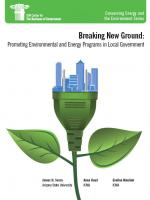
Breaking New Ground: Promoting Environmental and Energy Programs in Local Government

The survey asked questions regarding sustainability initiatives that have been undertaken by local governments. Over 2,000 local governments responded to the survey. The survey was developed by ICMA’s Center for Sustainable Communities, the Center for Urban Innovation at Arizona State University, the Arizona State University’s Global Institute of Sustainability, and the Alliance for Innovation.
In brief, the survey found that a large majority of the localities responding to the survey were at an “early stage” of adopting sustainability initiatives. While over 80% of localities reported initiatives in the area of recycling, transportation, and building energy use, adoption rates were much lower for other sustainability initiatives such as alternative energy generation and workplace alternatives.
In addition to the survey results, the report presents case studies of eight local governments across the nation that are considered leaders in sustainability initiatives. The case studies go beyond the survey results to discuss how each community linked their sustainability initiatives to broader community goals. The report concludes with seven action steps that local governments can take in developing a long-term, integrated approach to environmental,
economic, and social sustainability.
The Svara-Read-Moulder report comes to the conclusion: local government is still at the very earliest stages of adopting comprehensive sustainability programs in the areas of environment and energy. In this report, Svara, Read, and Moulder conclude, “Sustainability may be the ‘issue of our age’ but most local governments are still at a relatively early stage of addressing it. Most communities are taking some action, but the number and range of activities remain limited … Based on past experience with the spread of other local government innovations, most cities and counties will significantly increase sustainability activity in the future.”



